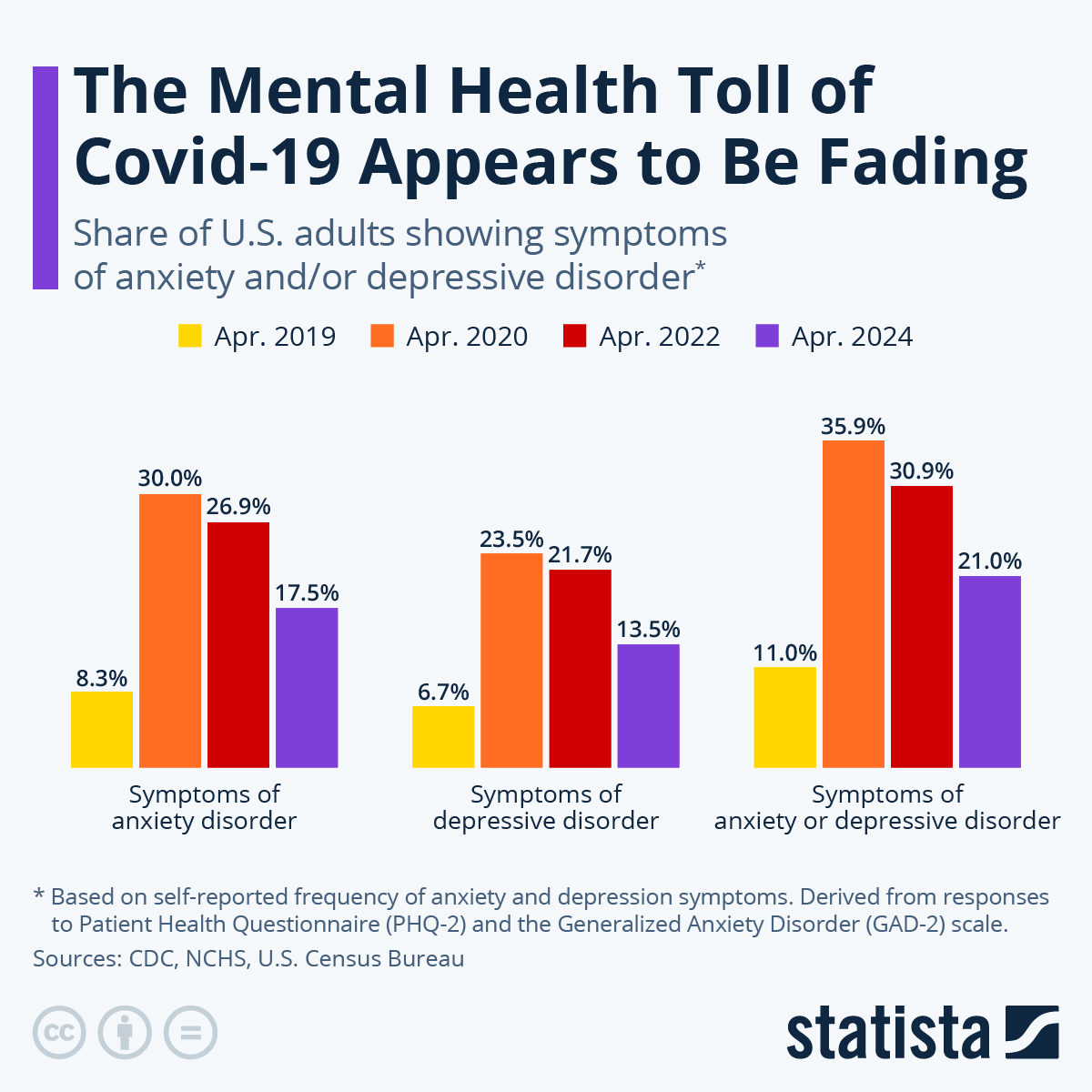Amidst the lingering effects of the COVID-19 pandemic, anxiety and depressive disorders continue to impact individuals worldwide. In April of 2020 Jonathan Kanter (Director of the Center for Science of Social Connection, University of Washington) and Katherine Manbeck (University of Washington) published an article “COVID-19 could lead to an epidemic of clinical depression, and the health care system isn’t ready for that, either” on The Conversation. That article discusses the perfect storm that COVID-19 produced for depression risks. “We do not wish to be the bearers of bad news. But this crisis, and our response to it, will have psychological consequences. Individuals, families and communities need to do what they can to prepare for a depression epidemic. Policymakers need to consider – and fund – a large-scale response to this coming crisis.” They were correct in their prediction. In April 2020 symptoms of anxiety disorder jumped from 8.3% to 30.8%, depressive disorder jumped from 6.7% to 23.5%, and anxiety or depressive disorder jumped from 11.0% to 35.9%
But what has happened to the numbers in April of 2024? Are we back to pre COVID-19 levels?
 You will find more infographics at Statista
You will find more infographics at Statista
In a study done by the Center for Disease Control (CDC) those numbers have decreased, but they are still twice as high as they were in 2019. In April 2024 the National Center for Health Statistics (NCHS) partnered with the Census Bureau and did a survey called the Household Pulse Survey. The survey showed that the levels are decreasing, but are still above pre COVID-19 levels. Symptoms of anxiety disorder has dropped from the 30.0% 2020 high to 17.5%, but that is still above the 8.3% from 2019. Symptoms of depressive disorder has dropped from the 23.5% 2020 high to 13.5% in 2024, but has not reached the level of 6.7% from 2019. Symptoms of anxiety or depressive disorder dropped to 21.0% in 2024 from a high of 35.9% in 2019, but still has not reached the pre COVID levels of 11.0% in 2019.
Coping with anxiety or depressive disorder, especially in the aftermath of a significant event like the COVID-19 pandemic, requires a multifaceted approach that addresses both the emotional and practical aspects of mental health. Here are some strategies that can help individuals cope:
- Seek Professional Help: Consulting a therapist or counselor can provide valuable support and guidance. They can offer techniques such as cognitive-behavioral therapy (CBT) or prescribe medications if necessary.
- Stay Connected: Maintaining social connections, even if it’s through virtual means, can combat feelings of loneliness and isolation. Reach out to friends, family, or support groups for emotional support.
- Establish Routine: Creating a daily routine can provide structure and stability, which is crucial for managing symptoms of anxiety or depression. Set regular times for sleeping, eating, working, and leisure activities.
- Practice Self-Care: Engage in activities that promote relaxation and well-being, such as exercise, meditation, deep breathing exercises, or hobbies that you enjoy.
- Limit Media Exposure: Constant exposure to news or social media can exacerbate anxiety. Stay informed, but set boundaries on how much time you spend consuming news, and prioritize sources that provide accurate and reliable information.
- Focus on What You Can Control: Concentrate on aspects of your life that you have control over and take steps to address them. Break tasks into smaller, manageable steps to avoid feeling overwhelmed.
- Healthy Lifestyle Choices: Pay attention to your physical health by eating nutritious foods, getting regular exercise, and prioritizing sleep. Avoid excessive alcohol or substance use, as they can worsen symptoms of anxiety and depression.
- Practice Mindfulness: Mindfulness techniques, such as mindfulness meditation or yoga, can help cultivate awareness of the present moment and reduce stress.
- Seek Meaning and Purpose: Engage in activities that give your life meaning and purpose, whether it’s volunteering, pursuing a hobby, or setting personal goals.
- Be Kind to Yourself: Remember that it’s okay to have bad days, and self-compassion is essential. Treat yourself with kindness and understanding, and don’t hesitate to ask for help when needed.
It’s important to recognize that recovery from anxiety or depression is a gradual process, and what works for one person may not work for another. Finding the right combination of strategies often involves trial and error, so be patient with yourself and remain persistent in seeking support and implementing coping techniques.
The best course of action would be to find a support group or some type of counseling help. Just one example of counseling available to the residents of Cedar Valley would be Eagle Mountain Counseling, Eagle Mountain Counseling is the Legacy Business of the Year for 2023 for the Eagle Mountain Chamber of Commerce, is dedicated to providing first-rate psychotherapeutic treatment to residents of Cedar Valley. With a mission focused on improving people’s situations and lives, they are well-equipped to help individuals struggling with anxiety and depressive disorders.
Mike Kieffer is an IT geek by hobby and trade, with a BS in Information Systems & Technology. He is a proud father of 10, a grandpa, an author, a journalist, and internet publisher. His motto is to “Elevate, Inspire and Inform”, and he is politically conservative and a Christian. Mike has a passion for technology, writing, and helping others. With a wealth of experience, he is committed to sharing his knowledge with others to help them reach their full potential. He is known for his jackassery or his form of self-expression that encourages boldness, creativity, and risk-taking. It can be a way to push the boundaries and challenge traditional norms, leading to creative solutions and positive change.
